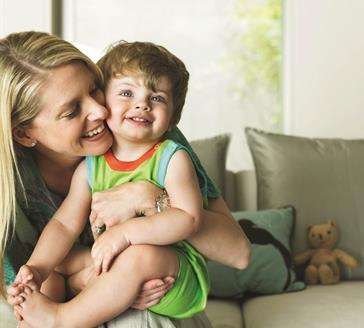Credit: Royal Holloway, University of London
Many parents think that giving their children interactive books with flaps, pop-ups and pull outs will help them learn to read, but research by Dr Jeanne Shinskey from the Department of Psychology at Royal Holloway, University of London has found this may actually stop toddlers from learning new words.
Children seem to use these books more like toys, distracting them from learning new words and concepts.
Dr Shinskey said: "Many educational picture books for toddlers often feature manipulatives like flaps or texture to encourage interaction, but do these actually help toddlers to learn new words? We wanted to test how a commercially-available book with or without flaps affected 2-year-olds' learning of a new word for an unfamiliar object."
Two groups of toddlers looked through a book with a researcher that contained nine food illustrations. The two groups were shown the same book, but one had flaps for the children to lift and the other didn't.
The books had a food that was an 'odd one out' – something that none of the toddlers were familiar with or had seen before. Carambola (or starfruit, as it's otherwise known) was shown to toddlers by the researchers, who told them what the fruit was six times. After reading the books with the toddlers, the researchers showed the toddlers pictures and replicas of the starfruit to see if they could name fruit. They were also shown pictures of fruits of similar colour and size (like lime, or kiwi) that the toddlers were not familiar with to see if they could tell the difference.
The children who looked at the book without flaps were significantly more likely to identify the starfruit.
Dr Shinskey said: "Books with these sort of features are very popular with parents who hope the interactive feature will aid learning and enjoyment of reading. However, if parents want their children to learn factual information about the world from books, it doesn't appear to help to make books more toy-like by adding 3-D features. This seems to enhance their tendency to treat books as just another type of physical toy, rather than a tool for learning.
"As the findings suggest young children can find these features in a book distracting we would recommend having a range of books available so children learn to love reading as well as learning more about the world around them."
Dr Jeanne Shinskey, will be presenting her research today (Wednesday 14 September 2016) at the British Psychological Society's Developmental Psychology Section annual conference.
Provided by Royal Holloway, University of London






















